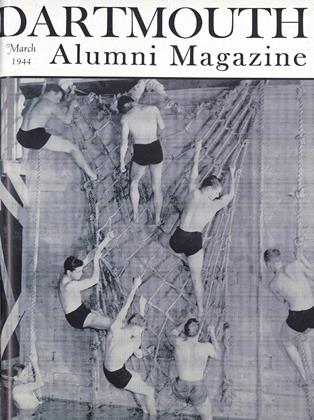IN REMONSTRANCE AGAINST the theory that it would be well if our American students in the colleges were required to know more than.they seem to know about their own country's history, a voice has been raised here and there by educators who feel that such a requirement would militate against making Americans truly global—that it would tend to provincialize them and make them face the future world with less adequate equipment.
One's horror at such a result will probably be most acute in those who have the most faith in the potential globality of the American mind, and would be least in the case of such as regard these hopes of a different post-war world as "globaloney"—to recall the word of a wise-cracking congresswoman. Undoubtedly the hopes of the global reformers rest on a great diminution of nationalism, which leads many to feel that hopes may be dupes. There is room for doubt, however, that a better factual knowledge of one's country's past will exalt nationalism unduly, or increase it beyond what it is bound to be anyhow.
This column has hitherto insisted that a really cultivated American should know more about the history of the United States than certain test-shafts sunk by investigators indicate that the majority do know. It is not easy to believe that increasing such knowledge will affect importantly the readiness of Americans to treat world problems in a truly global spirit, for or against. Nor is it easy to believe that the citizens of any other country are going to be found more global-minded than we are here. Human nature seems to alter distressingly little with the-ages; and, while three degrees of latitude or longitude may reverse all jurisprudence, it is doubtful that they have a similar effect on the human way of looking at things. If it would be unfortunate to spread a better knowledge of American history among American college boys, then the requirement that it be done would be just too bad. But it remains to show that there is any probability of harm in any practical way.
 View Full Issue
View Full Issue
More From This Issue
-
 Article
ArticleTEACHING NAVY TRAINEES
March 1944 By ARTHUR DEWING '25 -
 Sports
SportsWith Big Green Teams
March 1944 By Dick Gilman '45 -
 Class Notes
Class Notes1918
March 1944 By ERNEST H. EARLEY, DONALD L. BARR -
 Class Notes
Class Notes1931
March 1944 By CHARLES S. MCALLISTER, WILLIAM A. GEIGER -
 Lettter from the Editor
Lettter from the Editor'Round the Girdled Earth
March 1944 -
 Article
ArticleARTHUR FAIRBANKS '86
March 1944 By DR. FREDERIC P. LORD '98
Article
-
 Article
ArticleIn A Sperm Whale's Jaws
October 1954 -
 Article
ArticleSafe
February 1977 -
 Article
ArticleThe Satanic Verses: Why Were Muslims So Offended?
APRIL 1990 By A. Kevin Reinhart -
 Article
ArticleMemoirs of Dr Wheelock
By David McClure & Elijah Parish -
 Article
ArticleCleveland Leader
January 1942 By Jack English. -
 Article
ArticleSOPHOMORES
November 1950 By Peter B. Martin '51


